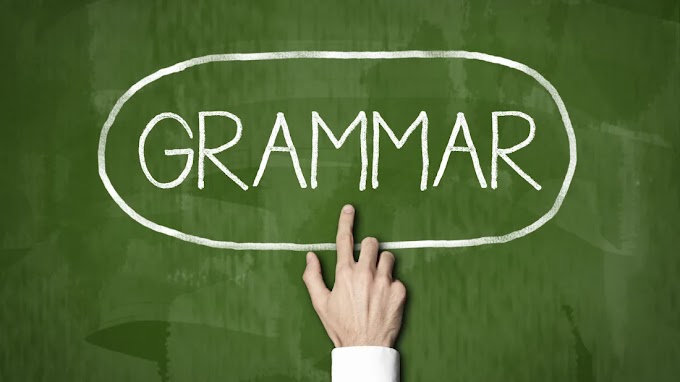Solved Questions on sentence, voice and speech
Exercise 1
1. My book has been stolen.
[Change into active voice]
2. Our team may lose the football match.
[Begin: The football match….]
3. Let me finish my job.
[Let my………]
4. The man ran after the stranger. He caught him.
[Running after…..]
5. She gave me clothes. She also helped me with shelter.
[Begin: Besides giving…]
6. He has three children. He must teach them the discipline.
[Combine to make a simple sentence by using an infinitive]
7. He said, “I go to school every day.”
[Change it into indirect speech]
8. She said, “last night I met my mother.”
[Change into indirect speech]
9. Pema said to us, “Are you going to the cinema today?”
[Change into indirect speech]
10. The bread has been eaten by Pema.
[Change into active voice]
Answer to Exercise 1
1. Someone has stolen my book.
2. The football match may be lost by our team
3. Let my job be finished by me.
4. Running after the stranger, the man caught him.
5. Besides giving me clothes, she helped me with shelter.
6. He has four children to teach the discipline.
7. He said that he goes to school every day.
8. She said that she had met her mother the previous night.
9. Pema inquired of us whether we were going to the cinema that day.
10. Pema ate the bread.
Exercise 2
1. Ugyen was given a magazine by me.
[Change into active voice]
2. When the movie was over, they went back to their house.
[Begin: At the end …….]
3. If you do not hurry you will miss the bus.
[Begin: You must…]
4. He is rich, but he is sad.
[In spite…]
5. He came out of the room as soon as he saw me.
[Begin: No sooner…]
6. I am sure that he will get through the examination.
[According to me…]
7. Mercury is the heaviest of all metals.
[Begin: No metal …]
8. “What a terrifying movie it is!” she said.
[Begin: She exclaimed ….]
9. He said to Dawa, “You are a stupid boy.”
[Change into indirect speech]
10. He had cheated his mates. They still believed him.
[Begin: Although he …]
Answer to Exercise 2
1. I gave Ugyen a magazine.
2. At the end of the movie, they went back to their house.
3. You must hurry or you will miss the bus.
4. In spite of being rich, he is sad.
5. No sooner did he see me than he came out of the room.
6. According to me, he will surely get through the examination.
7. No metal is as heavy as mercury.
8. She exclaimed that it was a terrifying movie.
9. He told Dawa that he was a stupid boy.
10. Although he cheated his mates, they still believed him.
Direction: rewrite the following sentences using the instruction given in brackets without changing their meaning.
1. He repeats words. Otherwise he is a good speaker.
[Begin: Except for…]
2. He is not only happy but also cheerful.
[Use: as well as]
3. Let me finish my painting.
[End: …by me]
4. You must do your assigned work on time.
[End: …by you]
5. The audience shouted at the speaker.
[End: … by the audience]
6. Bhutan is one of the smallest countries in Asia.
[Begin: Among all …]
7. A country in terror needs immediate help.
[Use: which]
8. Mother said, “Daughter, study hard to pass the examination”.
[Begin: Mother advised …]
9. He said, “Let’s return home soon.”
[He suggested …]
10. The teacher said to Dawa, “Did you do your project work yesterday?”
[End: … the day before]
Answer to Exercise 3
1. Except for repeating words he is a good speaker.
2. He is happy as well as cheerful.
3. Let my painting be finished by me.
4. The assigned work must be done on time by you.
5. The speaker was shouted at by the audience.
6. Among all the countries in Asia, Bhutan is one of the smallest.
7. A country that is in terror needs immediate help.
8. Mother advised her daughter to work hard to pass the examination.
9. He suggested returning home soon.
10. The teacher asked Dawa if he had done his project work the day before
Direction: rewrite the following sentences using the instruction given in brackets without changing their meaning.
1. The donkey is too old to learn new things.
[Begin: The donkey is so …]
2. Karma is as tall as Dorji.
[Begin: Dorji …]
3. The comic is lying on the bed. It is mine.
[Change into complex sentence]
4. I am too poor to own a house.
[End: … buy a house]
5. Speak the truth.
[End: …a lie.]
6. She is poorer than I.
[Begin: I am …]
7. Who taught you English?
[End: … taught English.]
8. Who taught you English?
[End: … taught to you]
9. She is so weak that she cannot run.
[End: … very weak]
10. Notwithstanding his old age, my grandfather works hard.
[Begin: My grandfather …]
Answer to Exercise 4
1. The donkey is so old that it cannot learn new things.
2. Dorji is not taller than Karma.
3. The comic which is lying on the bed is mine.
4. I am so poor that I cannot buy a house.
5. Do not tell a lie.
6. I am not as poor as she is.
7. By whom were you taught English.
8. By whom was English taught to you.
9. She cannot run as she is very weak.
10. My grandfather is old, but he works hard.
Direction: rewrite the following sentences using the instruction given in brackets without changing their meaning.
1. He must work hard to succeed in his examination.
[Change to compound sentence]
2. She is ugly, but she is happy.
[Begin: in spite of/ notwithstanding …]
3. I have no doubt that he will come tomorrow.
[Begin: He will ….]
4. All that glitters is not gold.
[Change to simple sentence]
5. We eat to live.
[End: …. may live]
6. He got angry when he was defeated in the debate.
[Being: On being …]
7. Heard melodies are sweet but those unheard are sweeter.
[Use: although]
8. He was lazy, therefore he failed.
[Begin: Owing to …]
9. If I were a bird I would fly.
[Use: in case of …]
10. How well she writes!
[End: … well]
Answer to Exercise 5
1. He must work hard or he will not succeed in his examination.
2. In spite of/ notwithstanding her ugliness, she is happy.
3. He will come tomorrow and I have no doubt about it.
4. All glittering things are not gold.
5. We eat so that we may live.
6. On being defeated in the debate, he got angry.
7. Unheard melodies are sweeter although heard are sweet.
8. Owing to his laziness, he failed.
9. I would fly in case of me being a bird.
10. She writes well.
7. No metal is as heavy as mercury.
8. She exclaimed that it was a terrifying movie.
9. He told Dawa that he was a stupid boy.
10. Although he cheated his mates, they still believed him.
Exercise 3
Direction: rewrite the following sentences using the instruction given in brackets without changing their meaning.
1. He repeats words. Otherwise he is a good speaker.
[Begin: Except for…]
2. He is not only happy but also cheerful.
[Use: as well as]
3. Let me finish my painting.
[End: …by me]
4. You must do your assigned work on time.
[End: …by you]
5. The audience shouted at the speaker.
[End: … by the audience]
6. Bhutan is one of the smallest countries in Asia.
[Begin: Among all …]
7. A country in terror needs immediate help.
[Use: which]
8. Mother said, “Daughter, study hard to pass the examination”.
[Begin: Mother advised …]
9. He said, “Let’s return home soon.”
[He suggested …]
10. The teacher said to Dawa, “Did you do your project work yesterday?”
[End: … the day before]
Answer to Exercise 3
1. Except for repeating words he is a good speaker.
2. He is happy as well as cheerful.
3. Let my painting be finished by me.
4. The assigned work must be done on time by you.
5. The speaker was shouted at by the audience.
6. Among all the countries in Asia, Bhutan is one of the smallest.
7. A country that is in terror needs immediate help.
8. Mother advised her daughter to work hard to pass the examination.
9. He suggested returning home soon.
10. The teacher asked Dawa if he had done his project work the day before
Exercise 4
1. The donkey is too old to learn new things.
[Begin: The donkey is so …]
2. Karma is as tall as Dorji.
[Begin: Dorji …]
3. The comic is lying on the bed. It is mine.
[Change into complex sentence]
4. I am too poor to own a house.
[End: … buy a house]
5. Speak the truth.
[End: …a lie.]
6. She is poorer than I.
[Begin: I am …]
7. Who taught you English?
[End: … taught English.]
8. Who taught you English?
[End: … taught to you]
9. She is so weak that she cannot run.
[End: … very weak]
10. Notwithstanding his old age, my grandfather works hard.
[Begin: My grandfather …]
Answer to Exercise 4
1. The donkey is so old that it cannot learn new things.
2. Dorji is not taller than Karma.
3. The comic which is lying on the bed is mine.
4. I am so poor that I cannot buy a house.
5. Do not tell a lie.
6. I am not as poor as she is.
7. By whom were you taught English.
8. By whom was English taught to you.
9. She cannot run as she is very weak.
10. My grandfather is old, but he works hard.
Exercise 5
1. He must work hard to succeed in his examination.
[Change to compound sentence]
2. She is ugly, but she is happy.
[Begin: in spite of/ notwithstanding …]
3. I have no doubt that he will come tomorrow.
[Begin: He will ….]
4. All that glitters is not gold.
[Change to simple sentence]
5. We eat to live.
[End: …. may live]
6. He got angry when he was defeated in the debate.
[Being: On being …]
7. Heard melodies are sweet but those unheard are sweeter.
[Use: although]
8. He was lazy, therefore he failed.
[Begin: Owing to …]
9. If I were a bird I would fly.
[Use: in case of …]
10. How well she writes!
[End: … well]
Answer to Exercise 5
1. He must work hard or he will not succeed in his examination.
2. In spite of/ notwithstanding her ugliness, she is happy.
3. He will come tomorrow and I have no doubt about it.
4. All glittering things are not gold.
5. We eat so that we may live.
6. On being defeated in the debate, he got angry.
7. Unheard melodies are sweeter although heard are sweet.
8. Owing to his laziness, he failed.
9. I would fly in case of me being a bird.
10. She writes well.
[😊If you liked this post please comment below🙏🙏 or give the rating👍. Such things would keep me motivated in uploading good contents😍]








1 Comments
Sorry to comment but your answer no. 10 of exercise 1 (no.10) is wrong. The bread has been eaten by Pema. (Change into to active voice). The correct answer is: Pema has eaten the bread. The rule is, if the active voice has present perfect (has/have+ past participle), only then the passive voice will follow the verb pattern of has/have+ been+ past participle. Therefore, considering the verb pattern given in passive voice (The bread has been eaten by Pema), the right answer (active voice) is Pema has eaten the bread, not Pema ate the bread. The answer you have given is the right answer for the passive voice; The bread was eaten by Pema.
ReplyDelete